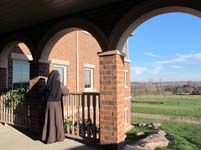Discalced Carmelite Nuns are called to live always in God's presence, pondering Christ and his words in Scripture. The Bible is our prayer book, from which we come to know and love Christ. In contemplation, we open our hearts and minds to his love and presence, in Scripture, in the liturgy, in God's creation, in our brothers and sisters, and in all the events of our lives.
Christ and Prayer
Discalced Carmelite Nuns are obliged by their vocation to "live in allegiance to Christ Jesus" and to "meditate day and night on the law of the Lord and watch in prayer." Holy Mother was faithful to this principle of the "primitive" Rule. She renewed the call to contemplation of Mt. Carmel's fathers of old. She made prayer the foundation of her daughters' life and their primary activity. For this reason, the Church expectantly asks all Teresian monasteries to enter deeply into the mystery of contemplative prayer and to offer an exemplary witness to it among God's People. (Const. No. 60)
Christ, Teacher of Prayer
Christ raised the prayer of his disciples to the dignity of a share in his own filial converse with his Father in the Holy Spirit (Lk. 11:2-4; Rom. 8:15-17). Model, teacher, and mediator of Christian prayer, he taught his friends the Our Father. This evangelical prayer expresses the intentions which the Christian holds dearest; and as Holy Mother Teresa of Jesus noted, it contains a program of life that follows the way of perfection. (Const. No. 62)
Contemplation
Therefore, in virtue of their vocation, they are called to contemplation in prayer and in life. Their commitment to continuous prayer is sustained by faith, by hope and above all, by divine charity. In that way they are enabled to reach the fullness of life in Christ with pure hearts. Through such prayer, they prepare themselves for ever more lavish gifts of the Spirit. (Const. No. 10)
Practice
The obligation of praying and of contemplating cannot be confined to participating in prayer at stated times. On the contrary, in the spirit of the Rule, it must permeate the entire existence of the Discalced Carmelite Nuns. In that way they will walk in the presence of the living God (1 Kings 18:24), put faith, hope and love unceasingly into practice and make their entire life a prayerful quest for union with God. As a consequence, prayer must be the first priority in organizing the life of the community and in the personal commitment of every nun. (Const. No. 61)
The spirit of the Rule and the example of our founders stress the importance in the life of Carmel of a full and attentive participation in the holy liturgical mysteries. (Const. No. 65)
The sacred liturgy is the highest expression of our sharing in the prayer of Christ. This participation is prolonged during the day in personal prayer. The liturgy enriches personal prayer which, in turn, enables us to bring a truly contemplativ to a worthy celebration of the divine mysteries. The sisters are to be suitably trained in liturgy, in accord with what the Church asks, so that they may participate in the sacred liturgy with full understanding and in an active and fruitful manner. (Const. No. 63)
1. Mass
When it celebrates the liturgy, the assembled religious community realizes the mystery of the Church and shares in the Paschal mystery of Christ and in his priestly office.
In fact, by word, sacraments and prayer, he nourishes and sanctifies his Church, and through the gift of the Holy spirit joins the Church to himself so that it may worship the Father's glory and obtain the well-being of the entire human family.
Therefore, by celebrating the Eucharist and the sacraments, and by proclaiming the word and singing the divine praises, a community builds and renews itself, expresses its union with the universal Church, and does its part for the coming of the Kingdom. (Const. No. 64)
The Eucharistic banquet is a sign of unity and bond of charity. Through its participation in the one bread and one cup (1 Cor. 10:17), the community is united as one body and one spirit. (Const. No. 66)
All the religious shall take part every day in the celebration of the Eucharist, which is the source and summit of the life of the Church. They will remain in prayer for a suitable period of time after mass in order to give thanks to the Lord. (Const. No. 66)
2. Eucharistic Adoration
At the heart of community life is the abiding Eucharistic presence of Christ, whom Holy Mother Teresa calls, "our Companion in the Most Holy Sacrament". It fosters union with him and sustains Teresian prayer for the Church. All the sisters will be sure to make a daily visit to the Lord present in the tabernacle. They will adore him and offer him other expressions of Eucharistic worship in keeping with the norms of the Church and with the traditions of their own monastery. (Const. No. 67)
3. Prayer of the Church
The Eucharistic praise and thanksgiving, the memorial of the mysteries of salvation, and the foretaste of heavenly glory that are celebrated in the Mass, are prolonged and renewed all day long by the Liturgy of the Hours. Through this liturgical payer, each community, in union with the Church in heaven and on earth, joins itself to the unceasing praise and supplications which Christ offers to the Father for the salvation of the whole world. (Const. No. 68)
Each community represents, in a special way, the Church at prayer and exercises its ministry of prayer on behalf of both the entire Mystical Body of Christ and the local Churches. Mindful of this, every community will celebrate in common every day all the hours of the Liturgy of the Hours - which comprise Morning Prayer, the Office of Readings, the three middle hours of Terce, Sext and None, Evening Prayer, and Night Prayer, - in accord with the norms of the Church. (Const. No. 69)





